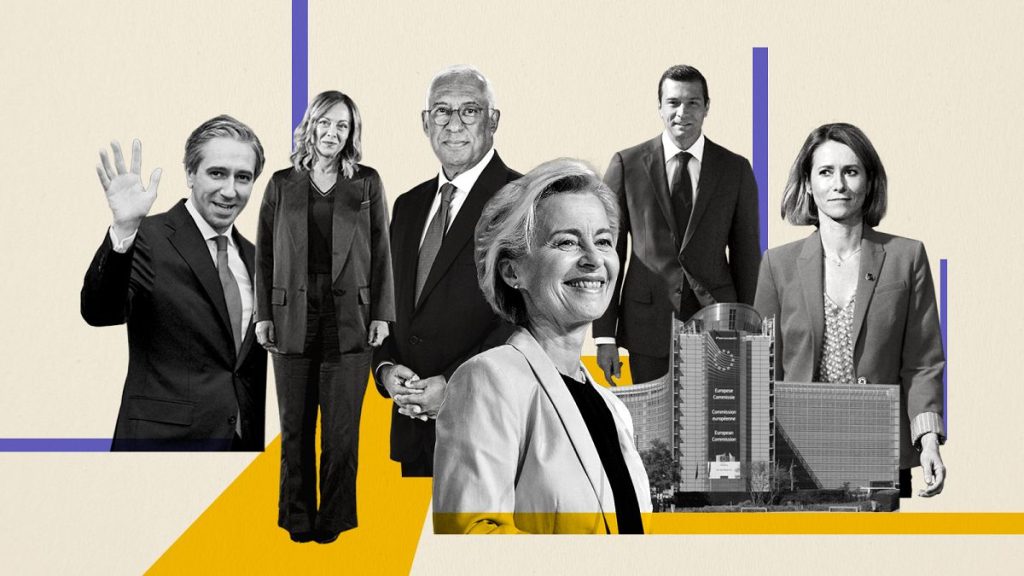The European Powerhouse: Key Figures Shaping the EU’s Future in 2025
The year 2025 marks a fresh chapter for the European Union, with a newly elected Commission and Parliament setting the stage for a new era of policy and direction. This period is characterized by a complex global landscape, requiring strong leadership and decisive action to navigate challenges and seize opportunities. From seasoned political veterans to emerging influencers, a diverse cast of individuals will play crucial roles in shaping the EU’s trajectory. This analysis delves into the profiles of 25 key figures who are poised to exert significant influence on the European project in 2025, categorizing them based on their roles and spheres of influence.
The first group comprises the most prominent figures at the helm of the EU institutions. Ursula von der Leyen, embarking on her second term as President of the European Commission, will continue to steer the EU’s agenda, focusing on boosting European competitiveness on the global stage. António Costa, President of the European Council, will orchestrate consensus among member states on critical issues like migration, international conflicts, and transatlantic relations. Kaja Kallas, the new High Representative for Foreign Affairs and Security Policy, will navigate complex diplomatic challenges, particularly concerning relations with the new Syrian regime and the EU’s neighboring countries. Donald Tusk, as Prime Minister of Poland during its EU Presidency in the first half of 2025, will prioritize supporting Ukraine’s EU aspirations and strengthening European defense capabilities. Mark Rutte, in his new role as NATO chief, will play a pivotal role in managing the transatlantic relationship with the newly elected US President Donald Trump, drawing on his experience and previous interactions with Trump.
The second tier of influence includes key figures within the European Commission who hold significant policy portfolios. Teresa Ribera, Executive Vice-President for a Clean, Just and Competitive Transition, will wield substantial power in shaping climate and competition policy, areas crucial for the EU’s future. External influencers also play a significant role, with Elon Musk, CEO of X and SpaceX, emerging as a controversial figure due to his newly acquired political influence in the US and his endorsement of Germany’s far-right AfD party. National leaders also exert considerable influence on the EU’s direction. Giorgia Meloni, Prime Minister of Italy, will be a key player in debates on migration, economic reform, and energy policy, while Mette Frederiksen, Prime Minister of Denmark during its EU Presidency in the second half of 2025, will advocate for firm migration policies and continued support for Ukraine. Volodymyr Zelenskyy, President of Ukraine, will rely on continued EU financial support amid potential shifts in US aid under the new Trump administration. Jordan Bardella, President of the French far-right National Rally, aims to expand his influence within the European Parliament.
Behind the scenes, a group of influential advisors and officials, the "éminences grises," wield considerable power. Manfred Weber, Chairman of the EPP Group in the European Parliament, will continue to steer the influential center-right bloc. Bjoern Seibert, Head of Cabinet for Ursula von der Leyen, and Pedro Lourtie, Head of Cabinet for António Costa, will play crucial roles in shaping their respective leaders’ agendas. Ilze Juhansone, Secretary General of the European Commission, will provide essential administrative support, while Nicola Procaccini, co-chair of the ECR group in the European Parliament, represents the rising influence of right-wing parties. Alessandro Chiocchietti, Secretary-General of the European Parliament, manages the institution’s budget and staff, and Teresa Anjinho, the new European Ombudsman, will investigate complaints against EU institutions. Paula Pinho, the Commission’s chief spokesperson, acts as the primary interface with the media.
The fourth category comprises individuals directly involved in specific policy areas. Piotr Serafin, European Commissioner for Budget and Administration, will be responsible for ensuring member states adhere to budgetary reforms and addressing any financial misconduct. Siegfried Muresan, MEP and lead negotiator on the EU’s long-term budget, will navigate complex budgetary discussions, including those related to EU enlargement. Janos Boka, Hungary’s Minister of European Affairs, will represent his country in its ongoing disputes with Brussels over rule-of-law breaches. Influential figures outside the formal EU structures also play a role. Mario Draghi, former Prime Minister of Italy, authored a report on European competitiveness that will inform the Commission’s future economic policies.
The final group highlights individuals whose actions have significant implications for the EU. Simon Harris, Taoiseach of Ireland, has taken a controversial stance by supporting South Africa’s case against Israel at the International Court of Justice, creating diplomatic tensions. Edi Rama, Prime Minister of Albania, is leading his country’s EU accession bid but faces scrutiny over a migrant detention center agreement with Italy.
These 25 individuals, spanning various levels of power and influence, represent a snapshot of the complex and dynamic forces shaping the EU’s future in 2025. Their actions, decisions, and interactions will determine the direction of the European project, navigating challenges and striving to achieve its goals in an increasingly complex global environment. The EU’s success in 2025 will depend on their ability to collaborate, compromise, and find common ground amidst diverse interests and perspectives. The interplay of these figures and the forces they represent will define the European narrative in the years to come.














